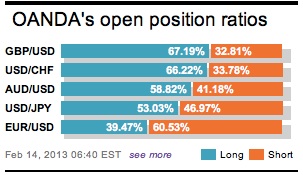A reading of global GDP reports has revealed another litany of woes. Contraction is no longer a vulgar economic word. It seems to be a staple amongst the maturing or cyclical economies defined under economics 101. The emerging economies, or new world order, are currently not in the same position to reproduce such damaging data. They are not the countries actively guiding or cajoling their currencies to underperforming levels. The claustrophobic growth squeeze remains healthy amongst the G7.

Abenomics has not arrived, but for Japan’s sake it hopes it comes soon. The prolonging of Japan’s recession into a third quarter shows that benefits from a weaker yen and rising stocks have yet to be felt. The country’s GDP contracted -0.1% in Q4, following an aggressive -1% fall in Q3, weaker than consensus expectations for a modest +0.1% rise. Perhaps painting an even damaging picture was exports falling -3.7%, q/q and hot on the heels of a -5.1% fall in Q3.
Trying to provide some sort of diversion was the scheduled Bank of Japan meeting. However, it ended up being a non-event. The BoJ has left key rates and asset purchases unchanged. They even voted 8-1 against a proposal to keep interest rates virtually at zero until the +2% price target is met. Aside from this weekends G20 meeting where Japan will be given the chance to define their interpretation of Abenomics to rest of the 19-members, the markets will now focus on the BoJ governor succession. Further dovish comments from possible successors are to be expected.
The result was not even a ‘hit and run’ on the single currency, it’s in fact an outright assault and that’s to be expected when a region can produce such poor growth numbers. Germany fell -0.6%, France -0.3%, Italy plummeting -0.9%, and even Spain and the Netherlands all contracted. Collectively, the Euro-zone economy plunged last quarter at its fastest pace in four-years, as weakening global activity and a crippling periphery recession have started to impede the shouldering abilities of Germany and France. Despite regional financial market conditions having improved, and now that the ECB is the EUR’s official backstop, new business activities is showing no signs of improvement.
GDP in the Euro-zone has fallen -0.6% in Q4. The market had been expecting a -0.4% drop. This is the third straight GDP decline and the fifth consecutive quarter that the Euro-zone has failed to expand. However, the 17-member currency gets no marks for consistency. Without European growth, the vicious circle can only continue. The weaker periphery’s can expect their government debt burdens to increase despite the ever-increasing firm focused austerity measures in play.
The once smoldering doubts in the European financial markets have the possibility of fully reigniting again. Record high regional unemployment continues to weigh on consumer spending while austerity measures cripple the federal level. It’s no wonder that everyone is hoping for a quick German V-shape rebound to economic growth to allow the country to once again take some of this excess baggage.

The EUR has firmly become unglued by GDP this morning. Global risk tones continue to sour as Euro-peripheral spreads widen and German Bunds lead US Treasury’s higher. All of this is adding to the recipe of a weaker EUR as we head Stateside. Long-term real money buyers briefly propped the pair, however, the mention of the possibility of negative deposit rates has again sellers lining the topside.

Other Links:
It’s Only Words But FX Is On The Move
This article is for general information purposes only. It is not investment advice or a solution to buy or sell securities. Opinions are the authors; not necessarily that of OANDA Corporation or any of its affiliates, subsidiaries, officers or directors. Leveraged trading is high risk and not suitable for all. You could lose all of your deposited funds.



